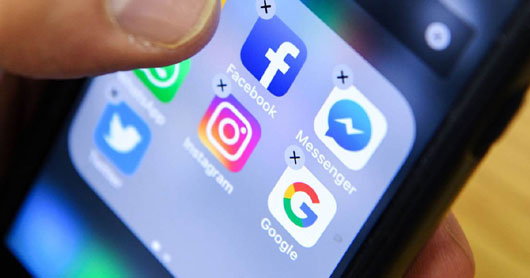CELEBRATING 20 YEARS OF EXCELLENCE: Countdown: Top stories of 2018
by WorldTribune Staff, December 26, 2018
The dark side of Silicon Valley came into clear view in 2018, and no one knows how to put the big data genie back into the bottle.
The Associated Press noted in a Dec. 24 report that the technology industry’s “dystopian potential” was unveiled in reports and congressional hearings on topics such as the political data-mining of millions of Facebook users “for the purpose of manipulating national elections” and how Google continually tracks its users’ movements whether the users “like it or not.”
 The list goes on, from “doorbells and concert venues that can pinpoint individual faces and alert police” to “automated systems that keep tabs of workers’ movements and habits” and “electric cars in Shanghai transmitting their every movement to the government.”
The list goes on, from “doorbells and concert venues that can pinpoint individual faces and alert police” to “automated systems that keep tabs of workers’ movements and habits” and “electric cars in Shanghai transmitting their every movement to the government.”
And, the report added “More awaits us in 2019, as surveillance and data-collection efforts ramp up and artificial intelligence systems start sounding more human, reading facial expressions and generating fake video images so realistic that it will be harder to detect malicious distortions of the truth.”
Earlier this month, Microsoft President Brad Smith called for regulating facial recognition technology so that the “year 2024 doesn’t look like a page” from George Orwell’s “1984”.
In a blog post and a Washington speech, Smith painted a bleak vision of all-seeing government surveillance systems forcing dissidents to hide in darkened rooms “to tap in code with hand signals on each other’s arms.”
To avoid such an Orwellian scenario, Smith advocates regulating technology so that anyone about to subject themselves to surveillance is properly notified.
Vint Cerf, the American who is recognized as one of the “fathers of the Internet,” said he and other engineers never imagined their vision of a worldwide network of connected computers would morph 45 years later into a surveillance system that collects personal information or a propaganda machine that could sway elections.
“We were just trying to get it to work,” said Cerf. “But now that it’s in the hands of the general public, there are people who … want it to work in a way that obviously does harm, or benefits themselves, or disrupts the political system. So we are going to have to deal with that.”
Earlier this month, the AP report noted, lawmakers grilled Google CEO Sundar Pichai at a congressional hearing in “a sequel to similar public reckonings this year” with Facebook CEO Mark Zuckerberg and other tech executives.
“It was necessary to convene this hearing because of the widening gap of distrust between technology companies and the American people,” House Majority Leader Kevin McCarthy said.
The “leave them alone” approach of the early Internet era won’t work anymore, said Rep. David Cicilline, a Rhode Island Democrat poised to take the helm of the House’s antitrust subcommittee.
“We’re seeing now some of the consequences of the abuses that can occur in these platforms if they remain unregulated without meaningful oversight or enforcement,” Cicilline said.
Too much regulation, however, may bring its own undesirable side effects, Cerf warned.
“It’s funny in a way because this online environment was supposed to remove friction from our ability to transact,” he said. “If in our desire, if not zeal, to protect people’s privacy we throw sand in the gears of everything, we may end up with a very secure system that doesn’t work very well.”
Check Out Geostrategy-Direct __________ Jump Start the U.S. Media
